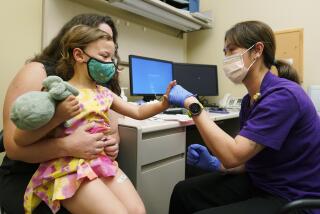When a Playmate Comes Along for the Ride, Review the Rules of the Road
- Share via
Parents know that traveling with children isn’t easy, but it’s worth the hassle to see new places through kids’ wide-open eyes. The potential problems multiply when you take along one of your child’s playmates--a “spare,” as my friend Deb Pfiffner of Burke, Va., calls them. When the Pfiffner family vacations at their North Carolina beach house, they generally take along a spare for each of their three children.
Inviting someone else’s child on a trip provides companionship for a little one, especially helpful if you have an only child. Some families find that everyone behaves a little better if a child brings a guest. If the spare is bright, curious and adaptable, the trip can be twice as fun. But if things don’t work out, you could be in for double trouble.
One mom I know sent her daughter on a skiing vacation with a friend’s family, and the daughter returned with a head full of lice. Others have found their children’s playmates so impossible to govern that the little guests have had to be sent home.
Jennie Fields, a friend from New York, remembers taking a trip to Cape Cod, Mass., with her daughter and a buddy, who developed a raging flu.
‘Let’s face it,” Fields said. “When it’s not your child, the loving motivation to clean up vomit just isn’t there.”
Letting your child share a vacation with a friend is a big responsibility, says Alice Cary, author of “Parents’ Guide to Hiking & Camping: A Trailside Guide” (W.W. Norton, 1997). She says that before you leave home, you should get a signed letter from the parents authorizing you to obtain medical treatment for the child and information on their insurance provider. You’ll need to know where the parents can be reached in case of an emergency and whether the child takes any medications or has any allergies.
If you’re traveling abroad, you probably will need a notarized statement from the parents authorizing you to take the child out of the country. (Information on which countries require such documentation is available from the State Department; see https://travel .state.gov/foreignentryreqs.html.)
You should find out about your young guest’s sleeping habits, athletic abilities, food preferences, fears and vulnerability to homesickness. It’s also smart to ask whether the child will have spending money to use as he or she wishes, and what kinds of TV shows, movies and videos he or she is allowed to watch.
And how do the parents feel about your disciplinary methods?
A key to making the trip go smoothly is talking with the child’s parents about these issues before you leave home. Mark Goulston, a Los Angeles psychiatrist, says that reaching an understanding with the parents about how you’re to discipline the child is of paramount importance but highly sensitive. “Ease into it and avoid putting them on the spot,” Goulston says. “Tell them how you discipline your child, and then ask them what they do.”
Better yet, “know the kid and know the family,” says Deborah Baratta, co-founder of Rascals in Paradise, a San Francisco tour company that specializes in family travel. This means spending time with the child before you even think about asking him or her on vacation. Author Cary says it’s easy to tell which kids will make good traveling companions when they come to your house to play. If the kids disappear, surfacing only for snacks and bathroom breaks, they’re a good match. But it’s a bad sign if they fight or start saying they’re bored.
Deb Pfiffner takes only kids she likes to the beach. She makes it clear that the guest will be treated like part of the family, expected to help and to abide by her rules. Most moms think it’s reasonable to pay the bill for the invited child, but one of Pfiffner’s pet peeves is kids who don’t at least offer to pay their own way at restaurants and tourist attractions, as she instructs her children to do when with friends’ families.
Author Cary thinks a child should be at least 10 to go along on a trip. And it should not be the child’s first time away from home, says Lilli Friedland, a therapist in Century City.
Teens can be difficult on the road because of their need for freedom. Margaret Bowles, associate head for academic affairs at Viewpoint School in Calabasas, has taken teenagers as far afield as China. She advises providing them with a packing list and establishing a telephone policy (those who need to call home often ought to have a phone card).
At any age, invited children will have a huge effect on a vacation. “Time away with your family is an opportunity to get closer,” says Goulston, the psychiatrist. “Bringing more kids can dilute the specialness of a family trip.” So think hard before taking a spare.
*
Rascals in Paradise, 2107 Van Ness Ave., Suite 403, San Francisco, CA 94109; telephone (800) 872-7225, fax (415) 921-7050, Internet https://www.rascalsinparadise.com.
Thomson Family Adventures, 14 Mount Auburn St., Watertown, MA 02472; tel. (800) 262-6255, fax (617) 923-0940, https://www.familyadventures.com.
U.S. Department of State, 2201 C St., N.W., Washington, DC 20520; tel. (202) 647-5225, fax (202) 647-3000, https://www.state.gov.
More to Read
Sign up for The Wild
We’ll help you find the best places to hike, bike and run, as well as the perfect silent spots for meditation and yoga.
You may occasionally receive promotional content from the Los Angeles Times.






